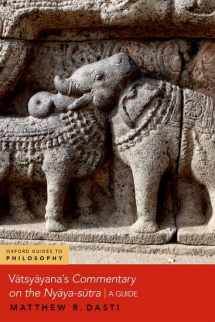
Vātsyāyana's Commentary on the Nyāya-sūtra: A Guide (OXFORD GUIDES TO PHILOSOPHY SERIES)
Book details
Summary
Description
Vatsyayana's Commentary on the Nyaya-sutra is one of classical India's most important philosophical works. This Guide offers both a map and interpretation of this challenging canonical text, suitable for any student or novice reader.
Treating them as a single hybrid text, the Nyaya-sutra with Vatsyayana's commentary systematizes in skeletal form centuries of ancient Indian philosophical developments concerning logic, epistemology, and dialectics, while also defending a realist categorial metaphysics. It offers a number of epistemological and methodological insights that inform intellectual inquiry in the Subcontinent for over a millennium. Vatsyayana's Commentary also provides sophisticated arguments for distinct positions in metaphysics, epistemology, philosophy of language, and value theory that stand amongst the best contributions to world philosophy.
This guide, accessible to students and researchers not familiar with classical Indian philosophy, provides a distilled, accessible understanding of the major scholarly, historical, and philosophical issues that inform the Commentary, while unpacking its philosophical content such that it speaks to modern readers. It also illustrates the way that the Commentary may serve as a lens through which to view the formative period of classical Indian philosophy.


We would LOVE it if you could help us and other readers by reviewing the book
Book review



